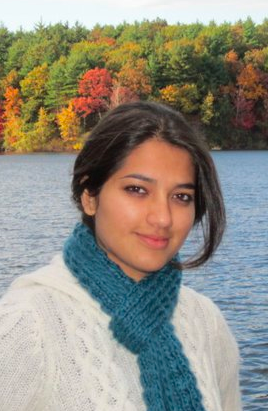Week 7: 30 minutes with 2011 Nobel Prize Winner Dr. Adam Riess by Rabeea Ahmed What thirty minutes with Dr. Adam Riess Taught Me: This week, I was fortunate enough to be given the chance to speak with Dr. Adam Riess on his work and research experiences. Dr. Riess won the 2011 Nobel Prize in Physics for “the discovery of the accelerating expansion of the Universe through observations of distant supernovae”[1] I came upon this opportunity by chance – it just so happened that Dr. Riess works at the Space Telescope Science Institute (STScI) [1] ,where I was interning this summer, and was kind enough to agree to meeting with me to share his thoughts on research. During my meeting with Dr. Reiss, I had the chance to exchange great information about scientific research, the challenges of the field and his method of research. I will summarize some of the things I learned from his company in this blog. 1. “Asking Too Many Questions Is Good” Dr. Riess and I talked about curiosity and how it leads to asking questions and creating more while trying to answer them. Dr. Riess pointed out that it is a very good trait in a scientist to be passionately curious and ask very many questions. Indeed, Dr. Riess’s research was based on his curiosity about the state of the universe. From speaking to him, I could clearly see that he was fascinated about the subject and eager to learn more about it. As it turned out from my discussions with him, not only is a good trait to be passionately curious about the universe, it is also a virtue to preserve in answering those questions. Indeed, Dr. Riess’s research that culminated in his discovery of the accelerating universe took many years to complete. 2. Don’t Be Afraid to Share Your Ideas In the course of my conversation, Dr. Riess pointed to a frame containing one of first publications of the exciting results he obtained from his study of the universe. He told me that at the time he published this paper, he was almost certain that someone would find and point out flaws in his theory or experiment, and that it was unlikely the idea would survive for very long. Surprisingly, Dr. Riess took a chance and the odds worked in his favor. I found Dr. Riess’s attitude towards criticism to be very inspiring. He was not intimidated by the prospect of being wrong. Rather, he seemed to think it a very natural part science research to be corrected and he looked at this as an opportunity to learn and refine his techniques. 3. Be Thorough, “Find Your Own Mistakes” I asked Dr. Riess for his thoughts on making mistakes. Performing numerous experimental setups and calculations and such can sometimes result in human error; eleven weeks at STScI had taught me this lesson and I re-tested my ideas often. However, the chance that my results might be wrong made me quite nervous and I often re-checked my work before I gave final presentations and notes. I asked Dr. Riess if he found the process of re-testing hypothesis and re-doing experiments nerve-racking as well. As it turned out, at the beginning of his research, he did. However, he told me that he soon realized that he was happy with finding his mistakes himself. He advised me to feel comfortable with the process of re-testing and to not be bogged down by flaws and mistakes I found in my own work. In fact, he assured me that finding mistakes in one’s own research shows one’s competence in the field and reflects the care with which one conducts research. It is, as he mentioned, much better to find one’s own mistakes and try to fix them than have them pointed out just because one wasn’t careful enough to re-test thoroughly. 5. “It is OK to make mistakes” Perhaps the most valuable take-home message from my meeting with Dr. Riess was his emphasis on perseverance. He mentioned that “It is okay to make mistakes in science!” Adding to the famous Niels Bohr quote that “An expert is a person who has made all the mistakes that can be made in a very narrow field”, Dr. Riess said that, “A genius is a person who makes all the mistakes in a short amount of time.” In our conversation, he seemed to emphasize the need to feel comfortable with making mistakes and sees them as a great learning opportunity. Never once did I even hear Dr. Riess consider mistakes as a sign of failure. If anything, he seems to think highly of them as a great opportunity to improve. Those were the lessons that I learned in thirty minutes with Dr. Adam Riess. I hope you find them as useful, inspiring and relevant as I did! [1] http://www.nobelprize.org/nobel_prizes/physics/laureates/2011/ About the Blogger
0 Comments
Your comment will be posted after it is approved.
Leave a Reply. |
The Lab JournalWelcome to the summer internship series of 2012! Follow 9 Scientista bloggers through their summer internships to catch a glimpse of what it is like to be a scientista^TM. By Title- India Presents: A "New World Symphony"
- Through The Lens: The Intricacies Of Diabetes - Do Nanoparticles Glow? - Using Unusual Animals to Study Human Disease - Using the Hubble Telescope - You Think What You Eat - Experimenting With the Life of a Scientist(a) - 18.085: My Summer at MIT - Science Heals: A Summer of Global Health Research By BloggerRabeea Ahmed
Riana Balahadia Shaira Bhanji Nzuekoh Nchinda Amy Beth Prager Natalie Punt Juliet Snyder Pin-Wen Wang Stephanie Wang Archives |
The Scientista Foundation, Inc. All Rights Reserved © 2011-2021 | Based in NY | [email protected]
The Network for Pre-Professional Women in Science and Engineering
The Scientista Foundation is a registered 501(c)(3) -- Donate!
The Network for Pre-Professional Women in Science and Engineering
The Scientista Foundation is a registered 501(c)(3) -- Donate!


 RSS Feed
RSS Feed